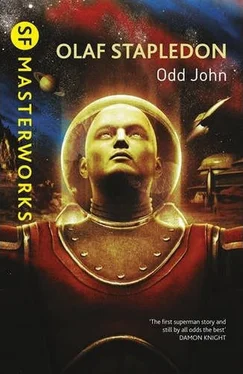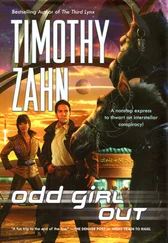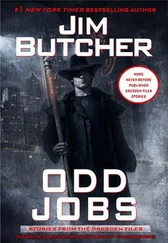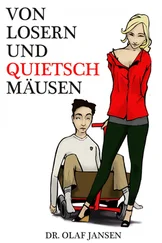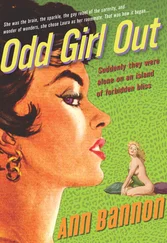Olaf Stapledon - Odd John
Здесь есть возможность читать онлайн «Olaf Stapledon - Odd John» весь текст электронной книги совершенно бесплатно (целиком полную версию без сокращений). В некоторых случаях можно слушать аудио, скачать через торрент в формате fb2 и присутствует краткое содержание. Город: London, Год выпуска: 2012, ISBN: 2012, Издательство: Hachette UK, Жанр: Фантастика и фэнтези, на английском языке. Описание произведения, (предисловие) а так же отзывы посетителей доступны на портале библиотеки ЛибКат.
- Название:Odd John
- Автор:
- Издательство:Hachette UK
- Жанр:
- Год:2012
- Город:London
- ISBN:9780450038570
- Рейтинг книги:5 / 5. Голосов: 1
-
Избранное:Добавить в избранное
- Отзывы:
-
Ваша оценка:
- 100
- 1
- 2
- 3
- 4
- 5
Odd John: краткое содержание, описание и аннотация
Предлагаем к чтению аннотацию, описание, краткое содержание или предисловие (зависит от того, что написал сам автор книги «Odd John»). Если вы не нашли необходимую информацию о книге — напишите в комментариях, мы постараемся отыскать её.
Odd John — читать онлайн бесплатно полную книгу (весь текст) целиком
Ниже представлен текст книги, разбитый по страницам. Система сохранения места последней прочитанной страницы, позволяет с удобством читать онлайн бесплатно книгу «Odd John», без необходимости каждый раз заново искать на чём Вы остановились. Поставьте закладку, и сможете в любой момент перейти на страницу, на которой закончили чтение.
Интервал:
Закладка:
The letter by which he effected this contact was nicely adapted to its purpose. It combined crude handwriting, bad spelling, dislike of religion, scraps of striking though crude philosophical analysis, and enthusiasm for the philosopher’s books. I quote a characteristic passage:
My father beet me for saying if god made the world he made a mess. I said you said it was silly to beet children, so he beet me again for knowing you said it. I said being abel to beet a fellow didn’t proove he was wrong. He said I was evil to answer back on my father. I said wots good and evil anyhow but just wot I like and don’t like. He said it was blastphemy. Please let me call and ask you some questiuns about how a mind works and wot it is.
John had already made several visits to the philosopher’s rooms in Cambridge, when he received a note from the astronomer. I should have explained that a young schoolmaster in a London suburb was allowing John to use his flat as a postal address. The astronomer asked John to come and meet “another very wide-awake boy,” who lived in Cambridge and was a friend of the philosopher. The ingenuity and relish which John displayed in defeating the repeated efforts of both men to bring about this meeting afforded me an amusing sidelight on his character, but I have not space to describe it.
The epistolary approach was used with equal effect upon a well-known modern poet. In this case the style of the letter and the persona which John assumed in the subsequent interviews were very different from those which had served for the astronomer and the philosopher. They were adjusted, moreover, not precisely to the conscious mentality of the poet as he was then known to the public and to himself, but to a mood or attitude in him which was subsequently to dominate his work. I quote the most striking passage from John’s letter:
In all my hideous frustration of spirit, at home, at school, and in my confused attempts to come to terms with the modern world, the greatest comfort and source of strength is your poetry. How is it, I wonder, that, although you seem simply to describe a tortured and degenerate civilization, the very describing lends it dignity and significance, as though revealing it to be, after all, not mere frustration, but the necessary darkness before some glorious enlightenment.
John’s efforts were not directed solely upon the intelligentsia and the leaders of political and social movements. Using appropriate methods, he made friends with engineers, artisans, clerks, dock-labourers. He acquired first-hand information about the mental differences between South Wales and Durham coal-miners. He was smuggled into Trade Union meetings. He had his soul saved in Baptist chapels. He received messages from a mythical dead sister in spiritualists’ seances . He spent some weeks attached to a gipsy caravan, touring the southern counties. This post he apparently gained by showing his proficiency at petty theft and at repairing pots and pans.
One activity he repeated again and again, spending on it a length of time which seemed to me disproportionate to its significance. He became very friendly with the owner of a fishing smack near home, and would often spend days or nights with this man and his mate on the estuary or the open sea. When I asked John why he gave so much attention to the fishing community and these two men in particular, he said, “Well, they’re damned fine stuff, these fishermen, and Abe and Mark are two of the best. You see, when Homo sapiens is up against the sort of job and the sort of life that’s not really beyond him, he’s all right. It’s only when civilization gives him a job that’s too much for his intelligence or too much for his imagination that he fails. And then the failure poisons him through and through.” It was not till long afterwards that I realized his ulterior purpose in giving so much attention to the sea. At one time he became very friendly with the skipper of a coasting schooner, and made several voyages with him up and down the narrow seas. I ought to have realized that one motive of these adventures was the desire to learn how to handle a ship.
One other matter should be mentioned here. John’s study of Homo sapiens now extended to the European Continent. In my capacity of family benefactor I was charged with the task of persuading Doe and Pax to join me on excursions to France, Germany, Italy, Scandinavia. John always accompanied us, with or without his brother and sister. Since Doe could not leave his practice frequently or for long at a time, these occasional family holidays had to be supplemented by trips in which the parents did not participate. I would announce that I had to “run over to Paris to a journalists’ conference,” or to Berlin to see a newspaper proprietor, or to Prague to report on a conference of philosophers, or to Moscow to see what they were doing about education. Then I would ask the parents to let me take John. Consent was certain, and our plans were often laid in detail before it was given. In this way John was enabled to carry on abroad the researches that he was already pursuing in the British Isles.
Foreign travel in John’s company was apt to be a humiliating experience. Not only did he learn to speak a new language in an incredibly short time and in a manner indistinguishable from that of the native; he was also amazingly quick at learning foreign customs and intuiting foreign attitudes of mind. Consequently, even in countries with which I was familiar I found myself outclassed by my companion within a few days after his arrival.
When it was a case of learning a language entirely new to him, John simply read through a grammar and a dictionary, took concentrated courses of pronunciation from one or two natives or from gramophone records, and proceeded to the country. At this stage he would be regarded by natives as a native child who had been in foreign parts for some time and had lost touch somewhat with his own speech. At the end of a week or so, in the case of most European languages, no one would suspect that he had ever been out of the country. Later in his career, when his travels took him farther afield, he reckoned that even an Eastern language, such as Japanese, could be thoroughly mastered in a fortnight from his landing in the country.
Travelling with John on the European Continent I often asked myself why I allowed this strange being to hold me perpetually as his slave. I had much time for thought, for John was as often as not away hunting some writer or scientist or priest, some politician or popular agitator. Or else he was getting in touch with the workers by travelling in third or fourth class railway carriages, or talking to navvies. While he was thus engaged he often preferred to be without me. Every now and then, however, I was needed to act the part of guardian or travelling tutor. Sometimes, when John was particularly anxious to avoid giving any suggestion of his unique superiority, he would coach me carefully before the interview, priming me with questions to ask and observations to make.
On one occasion, for instance, he persuaded me to take him to an eminent psychiatrist. John himself played the part of a backward and neurotic child while I discussed his case with the professional man. This interview led to a course of treatment for John, and occasional meetings between the psychiatrist and myself to discuss progress. The poor man remained throughout ignorant that his small patient, seemingly so absorbed in his own crazy fantasies, was all the while experimenting on the physician, and that my own intelligent, though often provoking, questions had all originated in the mind of the patient himself.
Why did I let John use me thus? Why did I allow him to occupy so much of my time and attention, and to interfere so seriously with my career as a journalist? It could hardly be said that he was lovable. Of course, he was unique material for the journalist or the biographer, and I had already decided that some day I would tell the world all that I knew of him. But it is clear that even at this early stage the unfledged spirit of John exercised over me a fascination more subtle than that of novelty. I think I felt already that he was groping towards some kind of spiritual re-orientation which would put the whole of existence in a new light. And I hoped that I myself should catch some gleam of this illumination. Not till much later did I realize that his vision was essentially beyond the range of normal human minds.
Читать дальшеИнтервал:
Закладка:
Похожие книги на «Odd John»
Представляем Вашему вниманию похожие книги на «Odd John» списком для выбора. Мы отобрали схожую по названию и смыслу литературу в надежде предоставить читателям больше вариантов отыскать новые, интересные, ещё непрочитанные произведения.
Обсуждение, отзывы о книге «Odd John» и просто собственные мнения читателей. Оставьте ваши комментарии, напишите, что Вы думаете о произведении, его смысле или главных героях. Укажите что конкретно понравилось, а что нет, и почему Вы так считаете.
